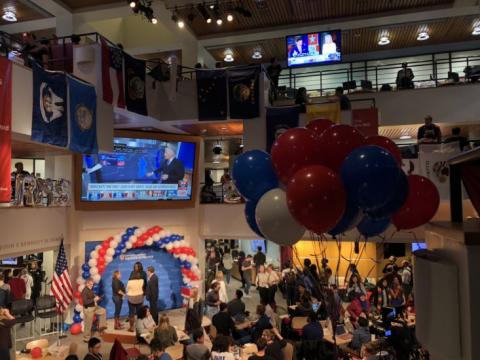With more than $5 billion estimated to have been spent on the 2018 midterm election cycle, politics in the US is a gamble and a business. The 6 November elections signalled the end of many months of heavy campaigning and voter registration initiatives on campus. On election day, my social studies class was half empty, with students choosing to miss it to phone bank for political candidates.
The general consensus was that the Democrats were going to win the House and the Republicans retain the Senate. Politics dominated all conversations and nerves began to surface. I noticed in my American friends, especially those involved in party politics, a feeling of exhaustion and excitement packaged into a nervous chatter.
I spent the day at several different watch parties, including the Harvard Democrat watch party held at the Institute of Politics. The room was full of people who had dedicated their summers, and part of their semester, to campaigning for the Democratic Party.
They watched the screen with anticipation as the results beginning to roll in. As Republican House Representative seats began to flip to Democrat, the room roared with pride. When CNN officially confirmed that the House of Representatives had turned blue, the room erupted. This was not just any election day for the people in the room. Donald Trump’s polarising politics has awakened a sense of urgency and passion among Democrat voters.
Catch up on Raphaëlle’s blogs
Harvard University
Brits in America: cramming my summer with internships
I also visited the Republican watch party. The mood was quieter and there was a nervous atmosphere. It was also a smaller and more tight-knit group and I was immediately noticed upon entry. Many in the room were aware that the “blue wave” was going to flip the House, however they remained optimistic about the Senate. I said hello to a few friends and as I left, an attendee asked whether I was departing because I did not wish to spend the evening with Republicans. The student was half joking, but there was a sensitivity underneath it. There is commonly held belief by right-leaning people on campus that they are held in disdain by the rest of the student body.
The UK was deeply divided during the Brexit referendum, but the political polarisation in the US is far more extensive and is having detrimental effects on friendships, relationships, and family structures. The main problem on campus at the moment is that politically involved Democrats and Republicans barely speak and the hostility was definitely heightened during midterm election season and, as I experienced, on election night.
During my internship with the Democratic Governor of New York this summer, I primarily worked on federal policy for the New York State, thus detaching myself from the tense political disputes raging between the Republican and Democratic party. Although my own personal opinions and values align with one party more than the other, I see a greater purpose in acting as a neutralising force between my Democratic and Republican friends.
Within the Institute of Politics, the Harvard Political Union (HPU) is one of the few places where people from across the political spectrum are welcomed and are genuine friends. I am a member of the HPU, seeing it as a training ground for future US politicians, and an opportunity to break down political polarisation. It was largely because of my friendly approach that I was able to gain access to the watch parties for the Democrats and the Republicans, and experience both main perspectives of US party politics.
The 2018 Midterms highlighted to me both the consolidation of the Harvard Democratic Party, normally divided on the liberalness of policy, and the fracturing of the Harvard student body based on political views. It will remain to be seen what the 2020 presidential election will further unearth.
Read more: Brits in America: experiencing the US political machine

Comments